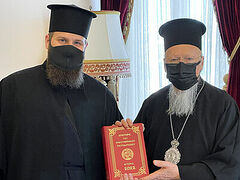New York, July 5, 2022
 Defrocked Alexander Belya with Archbishop Elipdophoros of GOARCH, which plans to make him a bishop. Photo: stmatrona.com
Defrocked Alexander Belya with Archbishop Elipdophoros of GOARCH, which plans to make him a bishop. Photo: stmatrona.com
In addition to the inter-jurisdictional scandal caused by the Patriarchate of Constantinople’s plans to consecrate the defrocked former archimandrite Alexander Belya to the episcopacy, he has also brought a lawsuit against several prominent clerics of the Russian Orthodox Church Outside of Russia, which has grown into a nationwide battle over religious freedom.
In fact, 14 states from across the nation have filed an amicus brief calling for Belya’s case (against the now reposed Metropolitan Hilarion, the former First Hierarch of ROCOR, His Grace Bishop Nicholas of Manhattan, the Eastern American Diocese, the ROCOR Synod of Bishops, and several priests) to be dismissed, citing its serious threat to religious freedom.
As the Becket Fund for Religious Liberty, which has taken up ROCOR’s defense, explains in its appeal, Belya’s case focuses on an internal ROCOR document that contested his supposed election as Bishop of Miami and called for his investigation on a number of serious charges, which he argues constitutes defamation.
Recall that in the summer of 2019, Belya sent a forged document to Moscow in hopes of becoming a bishop. He was then suspended and came under investigation on a number of charges. However, he refused to obey the ROCOR authorities and instead fled to the Greek Archdiocese and created the Slavic Vicariate. He was canonically defrocked by the ROCOR Holy Synod soon thereafter.
As the Becket Fund argues, this lawsuit violates both the church autonomy doctrine, which prevents courts from interfering in the appointment of clergy and a church’s right to “’facilitate religious communication and religious dialogue’ between a church and its flock,” and the ministerial exception, “which protects the church’s ‘authority to select, supervise, and if necessary, remove a minister without interference by secular authorities.’”
And the states of Nebraska, Alabama, Arizona, Arkansas, Georgia, Kansas, Kentucky, Louisiana, Mississippi, Missouri, Montana, Oklahoma, South Carolina, and Utah agree, referring to 21 legal precedents to make their case.
The amicus brief argues that, “Using state defamation law to punish churches for their leadership communications jeopardizes [the] freedom … to communicate about internal management decisions free from governmental interference.”
“Thus, the district court’s refusal to dismiss this case threatens to infringe on the First Amendment rights of a church and its leaders.”
“Second, amici also have an interest in protecting their courts from excessive entanglement in the internal affairs of religious groups,” the brief continues.
Further, the amici states explain that while arguing a defamation case, Belya is in fact seeking a legal recognition of his election as Bishop of Miami, which would require “the district court not only to resolve a fundamental decision about church leadership, but also to assess the church’s internal process for appointing bishops and to determine whether that process was followed. These inquiries are exactly the sort of church-state entanglement that courts must avoid.”
“For the foregoing reasons, this Court should reverse the district court’s decision and order the district court to dismiss Belya’s suit,” the brief concludes.
Follow OrthoChristian on Twitter, Vkontakte, Telegram, WhatsApp, MeWe, and Gab!




